- Home
- James Y. Bartlett
P.G.A. Spells Death Page 2
P.G.A. Spells Death Read online
Page 2
“Y-yes, Ben,” Digby said, head down, face red, eyes hidden.
“Go forth and sin no more,” Oswald said, and Digby left the room as if shot from a cannon.
When he was gone, Oswald smiled at the Notebook Guy.
“Tell me again why I can’t fire his fat ass?”
“He’s our most talented tech engineer,” Notebook said. “A little messy, a bit sloppy in performance. But very smart. Thinks outside the box. Good brain.”
“Needs too much babysitting,” Oswald said. “And I’m getting tired of changing his nappies. Let’s start looking for a replacement. But we’ll keep him around until we find one.”
Notebook made a note. Oswald turned and leveled his eyes at me.
“’If it bleeds, it leads,’” he said. I smiled winningly back at him. “Funny.”
“Thanks,” I said.
“I don’t do funny,” he said, eyes narrowed and glaring. “I don’t do wise guy, smart ass, hail fellow well met or yuckety yuck. I do television. Serious television. You got that?”
“Right,” I said. “No jokes. Super duper serious at all times. So, like if Woody Austin is trying to hit a shot from the edge of a pond and falls into the water after making his swing, you don’t want anyone giving him a snorkel and mask set the next day when he plays that hole?”
“That was hilarious,” Oswald said, smiling at the memory. Then he stopped smiling. “Wait…was that you?”
I shrugged. Tried to look modest. It actually wasn’t me, but I had been there.
“OK,” he said. “There are times when funny works. But not often, and never in my meetings. You got that?”
“Sure, Mr. Oswald,” I said.
“Mister Oswald is my father,” he said. “And he’s dead. I’m Ben or Boss, either one.”
“Right, Boss,” I said. “And I’m sorry for your loss.”
He stared at me. I could feel the screws inside this strange little man get ever tighter.
“Are you fuckin’ with me, Hacker?” he said. “Because if you’re fuckin’ with Ben Oswald …”
“I can expect something to be shoved up my colon,” I said. “I know, I heard.”
Notebook Guy began to laugh, breaking the tension in the room which had begun to make the walls bow. I was surprised that none of the monitors on the wall behind Oswald’s head shattered spontaneously.
“Oh, my God,” Notebook said. “This is going to be such a fun season. I can’t wait.”
Oswald and I just stared at each other.
2
Oswald dismissed me, and once outside of the meeting room torture chamber, I headed down the hall towards the bank of elevators at the far end of the building. About halfway down, I passed a brightly lit lunchroom. It had four wooden tables and folding chairs, a bank of vending machines against the wall, and a counter with some coffee making stuff, a microwave and a small sink. There was a small white refrigerator over in the corner.
Digby Allen was sitting at one of the tables. He was alone in the room and he looked like he might be alone in all the world. He was just sitting there, staring at the wall. His face was red. Hands were clasped in his lap, and I noticed they were clasped so tightly his fingers were white.
Don’t ask me why, because I couldn’t give you a cogent answer, but I went in. I walked over to the coffee counter, inserted one of those plastic pod cup things, pushed the button, waited for my cup of joe to stream out and took it over to the table where Digby was sitting.
“Mind if I join you?” I said and pulled out a chair and sat down.
He didn’t respond.
“That was my first meeting with The Assassin,” I said. “They all go like that?”
He didn’t respond. Didn’t even look at me. I sipped some coffee.
“Dunno,” I said, “Based on that meeting, I’d call him The Ass, not the Assassin.”
Digby smiled at that. Well, I saw the corners of his mouth twitch a little in what seemed to me like an upward arc. Could have been a smile.
“He wants to fire me,” Digby said. His voice was a hollow whisper. It came from a place of despair somewhere deep inside. “He thinks I’m a fucking idiot.”
“Yeah, well, Hacker’s first rule is you don’t care what they think,” I said. “You just do the best you can. If he doesn’t like that, well, that’s on him, not you.”
“Who’s Hacker?” he said.
I stuck out my hand. “That’d be me,” I said.
“Oh,” he said and this time he did smile. Sheepishly. “I’m Digby Allen.” He shook my hand. His hand felt moist.
“Yeah, I got that,” I said. “I also got that you need to do something about that router thingy.”
“The w-what?”
“Whatever it is that keeps breaking down,” I said. “Oswald and that well-dressed dandy—what is that guy’s name, anyway?”
Digby chuckled. “That’s Arnie Wasserman,” he said. “Ben’s shadow. His assistant. Title is associate producer.”
“Yeah, well, Arnie says that this is the sixth time that equipment has failed,” I said. “How come?”
Digby shrugged. “AirWaves provides all that gear,” he said. “They’re in charge of uplinking the bird to our control room. Every time it’s failed, I tell them they need to fix it, and they haven’t. And I get the blame.”
“Who is AirWaves?”
He looked at me and smiled a bit more.
“You’re that new guy, right?” he said, nodding to himself as if saying that’s why he’s such a dummy. “We contract with outside companies for almost everything on the production side these days,” he explained. “One company trucks in all the gear and sets up the infrastructure around the course. Cables and relays and signal intensifiers and all that stuff. Another company sets up the flybox…er…the control room. Somebody else provides and sets up the cameras and sound. They put microphones all over the course. IBS owns nothing. Everything is leased or contracted out. Ben and about twenty network guys come in and produce the show. And the talent belongs to IBS. But most of the gear belongs to someone else, even though me and the other people in the Tech department have to keep it running during the show.”
“Ah,” I said. “Outsourcing. It’s great unless it doesn’t work.”
Digby nodded. “Right,” he said.
“So have you told AirWaves about the latest failure?”
He shrugged. And looked sad again.
“Yeah,” he said. “Got the same old, same old.”
I sipped some of my coffee and thought for a minute. The coffee was horrible and I almost spit it out, but that would have coated poor Digby and he already had enough problems.
“Can you get someone from AirWaves on the phone?” I said. “Someone high up the chain.”
“Right now?” Digby asked, eyebrows raised.
“No time like the present,” I said, giving him my best earnest smile. Which usually didn’t work on most people. But it did with Digs.
He pulled out his phone, punched and swiped on it and finally hit the speaker button and put the phone down on the table. We listened to the metallic ringing and then someone answered.
“Hello, Digby,” said the voice on the other end. “Why are you bothering me again?”
“Who the hell is this?” I said, turning my voice into a harsh rasp. Digby reared back in shock.
“This is Bill Frankel at AirWaves,” the voice said. “Who the hell are you?”
“I’ll tell you who this is,” I barked back. “I’m the goddam Grim Reaper who’s about to make your fucking life miserable, you worthless piece of shit. Now you listen up and get this straight. Your chickenshit piece of worthless crap known as a control synthesizer failed to upload correctly last week. That’s the sixth time that shit has happened, and my man Digby tells me that he’s complained about it all six times. So I want you to hear this loud and clear, and it’s coming from the top, do you understand? The T-O-P! And this is t
he message…if that fucking thing goes down again…ever…I will cancel the fucking contract between IBS and AirWaves so fast that the ink will catch fire. You got that? I’ve already spent more time on this fucking bullshit than I want to think about. And I’m not gonna debate with you or reason with you or even talk with you about this again. You are going to find and fix this problem today or you can go peddle your worthless junk to some cable station in Paducah that doesn’t give a crap. This is fuckin’ IBS and I will not put up with your bullshit incompetence. Have I made myself as clear as a fucking bell, Bill?”
“Y-yes, Ben,” the voice said. “I will personally take care of this right away.”
“See that you do, you moron,” I said. “And one more thing…next time Digby calls to tell you something didn’t work right, you better goddam take care of it right then and there. If I ever hear that he’s being ignored again …”
“Right Ben,” the voice said. “Please, accept my personal apology. We’ll get that thing fixed. And I’ll call Digby and apologize to him.”
“That’s more like it,” I said. I reached over and punched the call disconnect button.
Digby Allen, who had been listening to this with ever widening eyes and mouth agape, could only shake his head.
“You sounded just like him,” he said, sounding amazed. “How did you do that?”
“Just one of my many talents,” I said. “I think Bill bought it. Do you?”
“Oh, yeah,” Digby said. “Totally.”
“Good,” I said. “And now he thinks that you and Ben are tight, so he’ll likely spread the word that Digby Allen is one connected dude, not to be fucked with. I think you’ll find that going forward AirWaves are a lot more responsive.”
“Geez,” Digby said. “Thanks.”
“No problem,” I said. I got up and tossed my cup of awful coffee in the waste bin. “You going to be down in Savannah?”
“Yeah,” he nodded. “I’ll be there.”
“I’ll see you later, then.”
I left. Hacker’s good deed for the day.
3
An hour later, I was waiting outside the office of somebody named Stephanie Collier. She was the senior vice president of golf operations for the Gold Organization. It said so right on the business card I had been given by someone at IBS when I was told to go meet with her. Two meetings in one day. How did I ever get so lucky?
I had strolled over from the IBS building on Sixth Avenue south of Times Square, wandering up Fifth Avenue almost to the Park and entered the magnificent golden atrium of the fabulous Gold Tower, which had become one of the main tourist attractions in a town filled with them. The five-story-high atrium was loaded with super-luxury European shops, fancy restaurants and cafes, and, of course, the Gold Museum, the monument to the life and story of Conrad Gold his own self.
I had managed to ignore all of that—I didn’t find myself in need of a four hundred dollar tattersall shirt from the English house of Turnbull and Asser, and I pretty much knew the rags to riches story of Conrad Gold—and jumped on one of the high-speed elevators which had whisked me up to the forty-somethingth floor at a speed that made my ears pop.
The sign over the lobby door outside the elevator told me I had arrived at the Golf Operations Division of the Gold Organization, and a lovely young receptionist welcomed me cheerfully, offered me a cup of Jamaican Blue Mountain and told me Stephanie would be right out.
Gold’s coffee was much better than the cafeteria crap I had almost spit out at IBS, and was served in a lovely Haviland china cup and saucer. I added some raw sugar and a dollop of fresh cream. There were a couple of issues of Gold Magazine on the coffee table in the waiting area, which I glanced at and did not read. Conrad’s own gleamingly bald coconut graced all the covers. Like Oprah does in her magazine. I dunno, if I ever start Hacker The Magazine, I’m thinking I’ll go with Taylor Swift or Scarlett Johannson on the cover.
The walls of the waiting room, painted a shade of royal hunting green, were filled with extra-large framed photos of Gold’s international collection of golf resorts and real estate developments. He had them in Florida, Arizona, Texas, southern California, upstate Michigan, Cape Cod, and, overseas, in Scotland, Ireland, southern France, Corsica, Greece and Israel. The man got around. I checked off the ones I’d been to, and could only remember about five. And three of those I’d visited before Conrad Gold bought them and added them to his golden stable of resort properties.
Of course, Gold also owned several pieces of expensive New York real estate, and even more out in L.A. Despite some setbacks with some Las Vegas casino deals that had gone south, Conrad Gold was still one of the richest men in the city and country. And while he had calmed down lately, ever since he had married a French movie starlet—wife number four, I think—he had once been one of the playboys of the western world. If you wanted to find him, all you had to do was pick up a copy of the National Enquirer, or the Page Six gossip pages, and there he’d be. Usually with some buxom beauty on his arm. Fending off reports that he owed back taxes, had been caught doing lines of coke in some nightclub or was feuding with one governor or another. Conrad Gold was a public man who liked to pretend he was a man of the public.
Another lovely young thing came prancing out from the back offices and told me Stephanie was ready for me now. I followed her back past the cubicles and glass-doored offices, all filled with trendy, fresh-faced and fashionable young people looking busy as bees. I’d heard that Conrad Gold only hired good looking people…no obese, zitted or scraggly haired types for him…and based on this sample, what I’d heard seemed to be true.
The senior vice president of golf marketing operations apparently was worthy enough to be assigned a very roomy corner office, with two window walls which framed the steeples and turrets of St. Patrick’s Cathedral, a block or so away.
“Mister Hacker,” she said, standing up from behind her desk as I was ushered in. “Stephanie Collier. So nice to meet you.”
“Thanks,” I said as we shook hands. I nodded out the window. “Not a bad view.”
She turned and looked out her windows as if it was something she had never done before. “Oh,” she said, “yes, it is, isn’t it? I confess that after the first week working here, I hardly take notice. Unless it’s raining or snowing or something.”
She motioned me into one of her guest chairs and I sat down. Stephanie was in her late thirties. Long blond hair, nice St. John knit dress that clung to and emphasized all her curves, which were quite nicely curving, and bright, alert blue eyes. Her pale wood desk was mostly empty, save for her laptop and telephone. There was a gold framed photograph next to her telephone showing her with a smiling, goateed man and a young boy of about three who was trying to smile for the camera, but looked more like he was grimacing with a stomach pain.
“So Conrad told me a lot about you,” she said, “And some of your adventures in St. Andrews a year or so ago. “Did you really crash into one of our suites with the special forces from Mi5?”
I chuckled. “Um, no,” I said. “I think that story has been upgraded a bit from the truth of it. I watched the operation from the safety of the command vehicle outside. But those guys were quite efficient at what they do.”
“I’ll bet,” she said. She reached into her desk drawer and pulled out a brochure.
“What do you know about the Gold Hudson Links?” she asked.
“Practically nothing,” I said. Which was true. Obviously I knew that Conrad Gold had managed to get the PGA of America to reward his new golf development with the upcoming PGA Championship. But even back in the halcyon days when I covered the game of golf for the Boston Journal, I had never spent much time or effort trying to keep track of new golf developments. That was a job for the real estate or travel editors, not the golf writer. Of course, it had been decades since the Journal had had either one of those on staff.
“Well, this will help then,” she said and slipped the brochure
across the desk toward me. I picked it up and glanced at the cover, which showed a golf hole photographed dramatically in late afternoon, so the shadows cast across the fairway were long. It showed a green set near the blue waters of the Hudson River, low rolling hills in the background on the far shore and a hint of mountains in the background. The picture looked like one of the painters from the Hudson River School had executed it in fine oils.
“We consider the Hudson Links to be one of our premier properties,” Stephanie continued. “It’s just 55 miles from Manhattan, which is less than a 30 minute helicopter ride from the West Side Heliport.”
“How long if you’re riding a mule-drawn buckboard?” I asked. “Which is more my speed.”
She laughed, tossing her head back.
“Conrad told me you were a wit,” she said.
“Did he now?” I said.
“In fact,” she continued as if my wit had not intervened, “Conrad first saw the land that is now the Gold Hudson Links riding in a helicopter flying up the Hudson River.”
“Is that right?” I said.
“Yes,” she said, nodding earnestly. “It was about ten years ago, and Conrad was on his way to play golf at the Paramount Country Club in New City—that club was founded in 1918 by Adolph Zukor who started Paramount Pictures. And Conrad looked out the window of the copter and saw the property—wetlands and river frontage and rocky high ground—and thought ‘That would make a great site for a club.’ And he asked around, began assembling the parcels and…well, here we are!”
“Yes,” I said, “Here we are. But the question is…why?”

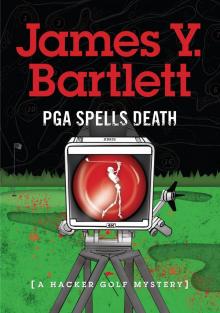 P.G.A. Spells Death
P.G.A. Spells Death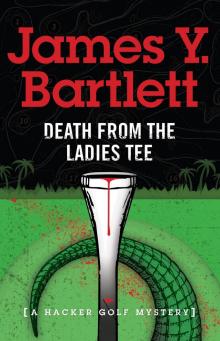 Death from the Ladies Tee
Death from the Ladies Tee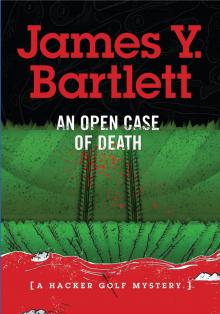 An Open Case of Death
An Open Case of Death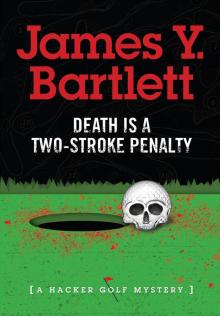 Death is a Two-Stroke Penalty
Death is a Two-Stroke Penalty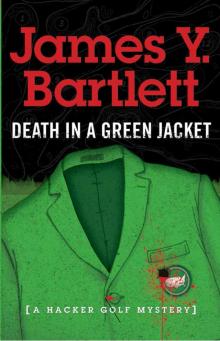 Death in a Green Jacket
Death in a Green Jacket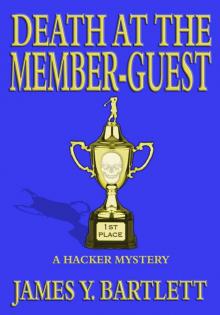 Death at the Member Guest
Death at the Member Guest